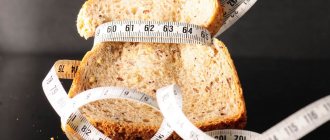You, of course, know about the dangers of sugar for the body. Do you know how much of this sweetener the average person eats per year? About 40 kilograms! Perhaps this figure will make you think about reducing the amount of sweets, or even cause you to completely give up sugar? I propose to take a closer look at white crystals.
How does sucrose enter our body?
Maybe, having made some simple calculations in your head, you will come to the conclusion that the mentioned 40 kg is not your story. If so, then take a bottle of ketchup, kvass, mustard or sausage out of the refrigerator and read the ingredients on the label. Almost all sauces, many foods, alcohol, soft drinks, dairy products and, of course, desserts contain sugar. It is even added to some semi-finished products, in which its presence will clearly surprise you. Although, everything falls into place if we remember that sweet crystals are a natural preservative. In addition, their natural variation is found in berries, fruits and vegetables.
Snacks should be healthy
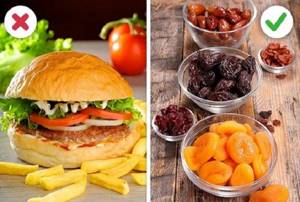
It is not always possible to organize our nutrition correctly, especially during working hours, which is why we often snack on anything (fast food, cookies, ice cream, etc.). Instead of a pack of cookies, buy dried fruits. They relieve hunger well, while containing vitamins, minerals, fiber and “healthy” sugar, which will not affect your figure in any way.
What threatens sugar lovers?
General data on the harm of sugar-containing products to humans
- The sweetener we are used to is a simple carbohydrate, which not only comes into the body empty-handed, but also requires a lot of resources extracted from other products to process it.
- Along the way, disrupting protein and carbohydrate metabolism, granulated sugar leaches calcium from bone tissue, which leads to: - deterioration of the condition of teeth, nails and bones; - problems with blood vessels; - disruption of normal metabolism.
- An increase in blood glucose levels forces the pancreas to work “overtime”, which leads to depletion of the organ and the person is rewarded with diabetes.
- For sedentary people, the crystalline substance brings not only banal obesity, but also a bouquet of cardiovascular diseases. And also, they will be able to get to know atherosclerosis as closely as possible.
- High levels of glucose in the blood can cause the appearance of malignant tumors of the gastrointestinal tract (GIT).
- But that's not all.
A passion for sweets is also rewarded with candidiasis, problems with the digestive system, metabolic disorders and reduced immunity.

Anti benefits for men
Consumption of sugar in quantities exceeding the norm, as a rule, also affects the reproductive system. Men with a sweet tooth at the age of 35 already have problems with potency.
What women pay for sugar addiction
In recent years, marketing specialists have achieved that only the lazy do not know the words “collagen” and “elastin”. So, a passion for sweets disrupts the exchange of these two building materials. This means that it prevents the skin from remaining tight and fresh.
Additional Benefits of Quitting Sugar
You cannot ignore such important factors as increasing self-esteem and training willpower. The consequence of complete refusal is a feeling of pride in oneself at the end of the journey, which provides a huge incentive for new achievements! Well, have you already thought about how to give up sugar forever?
What have I forbidden myself?
Granulated sugar and sweetener substitutes were banned. I gave up baked goods, cakes, pastries and cookies. Introduced a taboo on sweets: chocolate bars, candies, preserves, jams and condensed milk. Chewing gum containing a lot of sugar was also blacklisted. The list of prohibited products included sweet drinks (compotes, fruit drinks, lemonades, jelly, juices), yoghurts with additives, curds, glazed curd cheeses, fruits with a high sugar content (bananas and grapes) and white bread.
I promised myself to drink 1.5-2 liters of water throughout the day. I decided to do physical exercise for 30-40 minutes every day.
Should you give up sweets completely?
Although let's delve a little deeper into the topic: is it possible, and should we, give up sugar completely?
In fact, completely eliminating sugar from the daily menu is fraught with a deficiency of nutrients and imbalanced nutrition. After all, as we have already said, this substance is contained in many “harmless” products, and according to healthy nutrition experts, an adult should eat about half a kilogram of fruits alone. But granulated sugar and highly processed products that contain it should really enter your body with food in minimal quantities.

Daily intake of simple carbohydrates for nutrition
Carbohydrates in and of themselves are not harmful to our health. Sugars cause damage even when we move little. Carbohydrates are essential for our body and should make up 25-65% of daily calories. Of these, according to WHO recommendations, only 10% of daily calories are allocated to simple carbohydrates. For example, if on average you consume 1300 kcal per day, then the maximum simple carbohydrates you can afford is 130 kcal, that is, 6 level teaspoons of granulated sugar, or two chocolates. It is advisable to consume even less when losing weight. But complete refusal, as a rule, has the effect of a compressed spring - after a long period of abstinence, there is a risk of pouncing on the forbidden and eating kilograms of it. Therefore, in addition to the fact that it is better to consume simple carbohydrates less than the daily norm, they should not include carbonated and packaged drinks, as well as sugar-containing dairy products.

Disadvantages of giving up desserts - impact on the nervous system
What happens to the body when you give up sugar is often compared to drug, cigarette or alcohol withdrawal. I don’t agree with this opinion: everything is not so critical. But still, the habit will definitely make itself felt. Irritability and the desire to snack are a common “side effect” of refusal. We are just used to exciting the nervous system with sweets, now it will miss it, which will most likely affect your mood. Ask your loved ones to be understanding of your condition. By the way, perhaps at first you will feel tired and unable to concentrate, but over time this will pass.
Eat a square of dark chocolate every day to relieve stress in your body.

New life
I still feel hungry from time to time - but not nearly as often . I feel full for seven to eight hours straight. I now realize that when I felt hungry (every three hours), my body simply demanded another hit of sugar.
I don't miss sugar in coffee at all. When I see shelves of chocolates in a store, I perceive them as pieces of cardboard - I don’t want to eat them at all. And for the first time in my life I feel the richness and nuances of the taste of vegetables and fruits. Now it’s clear why oranges were once given to children for Christmas. Who needs chocolate when there's something so sweet?
But I'm still afraid that at some point I won't be able to give up refined sugar. Everything is against me. Refined sugar is hidden in tens of thousands of products, and it affects the brain more powerfully than cocaine . Thanks to marketing, it's everywhere, and there's no way to avoid it—unless you decide to do what I did and cook only fresh ingredients. Sometimes, unfortunately, time and busyness do not allow this.
Still, the benefits I experienced by eliminating refined sugar from my diet for just two weeks are too powerful to ignore. I hope this is enough for me.
What happens after giving up sugar?
This is an indicative scenario to give you an idea of what the worst case scenario would be if you cut out sugar. So, if you have survived the period of one day, you can be congratulated: one important test is already behind you.
Let's look at how to reduce sugar intake week by week
1 - withdrawal time of the first week after stopping to consume sugar
Now you will most likely experience withdrawal symptoms. Both physically and psychologically, you will crave just a little something sweet. Why should you give up sugar at this moment? Because right now you need to overcome yourself so as not to break down. The best thing you can do at this time is to eat a couple of your favorite vegetables, fruits or a handful of berries. This will help regulate your blood sugar levels and, as a result, alleviate your condition. The craving for desserts will accompany you throughout the first week. In addition, feelings of anxiety may arise. Remember that you can eat away a bad mood and anxiety; the main thing is to use fruits, berries and vegetables for these purposes.
2 - gradually returning healthy appearance of teeth and skin
Is it possible to give up sugar? You've already done it! This means that the second week is tough for you, despite your difficult emotional state. But let's look at giving up sugar from the other side, or rather, at the changes in the body: your teeth and skin already look healthier, there is less acne, if last week you had problems sleeping, now you fall asleep much easier.
3 - pleasant sensations of comfort from changing the way you eat
This is what will happen by this time if you completely give up sugar: your body will get used to it and will already feel quite comfortable in its new state. The natural sucrose of fruits will be enough for him.

Month, second and third of working on yourself
What happens when you give up sugar after a month: you already enjoy natural foods.
Now you feel noticeably better physically and psychologically, the excess weight is gone, since along with sugar you have given up many flour products and fatty foods.
If you really made it through 2 months, you can now reward yourself with a small portion of food from the “forbidden” list once a week.
What factors influence the process of addiction?
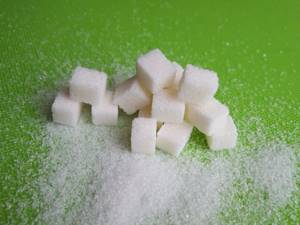
There are three main factors that influence how dependent you are on sugar. These include:
- Duration - Chances are you've been consuming sugar for most of your life so far. This has a serious impact on addiction because the body has long been accustomed to it. The more time you have consumed sweets, the more difficult it will be to give them up later.
- Quantity - How much sugar and confectionery do you eat in a day? The more you eat sweets, the harder it will be to give them up. Russians on average consume 100 grams of sugar every day (assuming the norm is 25 grams per day). This is equivalent to 36 kg of sugar per year! Please note that just one century ago, the use of this product in our country was 2 kg per year (34 kg less)! So beware! Don't start the day with sugary cereal because you're expected to sweeten your coffee, have a croissant or donut for lunch, and top it off with a sweetened soda... And before you feel like you've had too much sugar, it's already jumped higher. norms.
- Individual Psychology - Some people are easily tempted and seduced, making them more susceptible to addiction. It depends on various factors such as: Heredity – Genes play a big role in addiction. It was found that 60% of alcoholics have other relatives with alcohol addiction. Social Environment – If people around you consume a lot of sugar, it will be harder for you to give it up. Mental health problems – If you suffer from anxiety or depression, you are more likely to become addicted to sugar.
How to Say No to Sucrose
How to give up sugar correctly?
If you already have experience of giving up something (alcohol, cigarettes, watching TV at night, etc.) or you are a decisive person by nature, then it’s better to cut from the shoulder: today before going to bed they said “no”, but Tomorrow morning we entered into a new life. However, if you are not sure that you have sufficient willpower, it is better to undergo a little training. Here's a little guide on how to give up sugar easier.
Half a spoon less sugar
If you usually drink tea and coffee with two tablespoons of sugar, now try using half a spoon less for a couple of days. Drink it another day with one spoon. Then remove refined granulated sugar completely or use a sweetener.

Eliminate sweet desserts from your diet
Are sweet desserts and cakes your faithful daily companions? We also reduce their quantity or try to eat them at intervals of one, then two days, and then completely remove them from the diet.
Eat more fruits instead of sugar
Is it worth torturing yourself and giving up sugar if you are afraid of failure in advance?
Of course, just eat more fruits, especially during “attacks” when you really want something sweet. Then you will satisfy the body’s need for glucose, all that remains is to overcome psychological cravings. And don't forget about water!
We avoid pastry shops
Explore a different route to work—one that bypasses your favorite candy store.
Add milk, cream, cinnamon, nutmeg
Use spices and additives, discover new tastes. For example, if you completely avoid sugar in coffee, you can add milk, cream, cinnamon, and nutmeg instead of a sweetener to improve the taste.
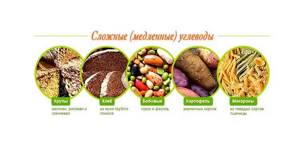
Do exercises and burn fat
The benefits of giving up sugar affect not only your internal state, but also your figure. If you want to eat a delicious piece of cake, first do 15 squats and 15 push-ups, or go jogging.
Physical exercise and sports burn fat and are generally very good for health, and the brain perceives training as a pleasure, no less than a dessert!
We take part in marathons
Become a frequent visitor to forums where people share their experiences and talk about the consequences of quitting sugar. Participate in marathons with like-minded people. Let complex carbohydrates appear in your daily menu.
What can you eat if you are giving up sugar?
- rye and barley bread;
- legumes;
- potatoes, radish, carrots, pumpkin;
- wheat, millet, buckwheat, rice, oatmeal, barley, corn porridge;
- durum wheat pasta;
- spinach, cabbage, greens, lettuce.
This is necessary to get a boost of energy and a good mood, but the main thing is that these products will reduce the body’s need for simple carbohydrates. For motivation, I suggest watching the following video:
Avoid sugary drinks
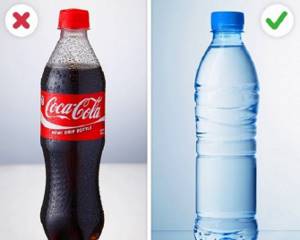
One of the big problems with gaining excess weight is the wrong drinking regimen, and not food at all. We have forgotten how to drink regular water, preferring soda and pseudo-natural juices from boxes. They contain nothing except a flavor enhancer, coloring and a huge amount of sugar. This water is perceived by the body as food. And excess carbohydrates literally settle on the stomach, buttocks and thighs in the form of fat folds. A larger amount of clean drinking water will not only saturate the body with moisture, but also quell a slight hunger.
“I’m like a zombie”: a British woman suffering from Covid-19 developed rare symptoms in her neck
“It slipped my mind”: a normal phenomenon or a sign of cognitive old age?
The time for fortune telling is approaching: what dates in January 2021 are best to do this?
Sugar substitutes - natural sweeteners
Fructose does not cause a sharp release of insulin
A natural sweetener found in honey and many fruits and vegetables. Unlike harmful sand, fructose normalizes blood sugar, improves immunity, and minimizes the risk of caries and diathesis. In addition, taking it does not cause a sharp release of insulin; after consuming it, the sugar level increases more slowly and less than after consuming glucose. Fructose is highly soluble in water, making it suitable for cooking and baking. Its additional advantage is a tonic effect and a surge of vigor after taking it. An overdose is fraught with changes in the acid-base balance.
Sorbitol
Contained in rowan berries, sloe, hawthorn, cotoneaster and some fruits. Has a cooling sweet taste. Half the calories and just as much less sweet than sugar. From useful: sorbitol is recommended by doctors, it has a positive effect on the gallbladder and intestinal microflora, and also reduces the consumption of biotin and vitamins B1 and B6. However, it also has side effects. Sorbitol can cause bloating, nausea, diarrhea, and increased lactic acid levels in the blood.

Xylitol
There are few sources of xylitol production, so the sweetener, which tastes very much like sugar, is 10 times more expensive than the latter. Xylitol is absorbed by the body very slowly. Therefore, in case of overdose, it accumulates in the intestines, causing stomach upset and bloating.
Thaumatin
Low-calorie taste corrector. Its taste is significantly different from sucrose; the sensation of sweetness in the mouth occurs later, although it lasts longer. It dissolves well in water and tolerates high temperatures, so it is suitable for PP recipes.
Stevia
Stevia is a new generation sweetener, many times sweeter than sucrose. It lowers glucose levels, normalizes blood pressure and is known as an antiarrhythmic substance. In addition, stevia promotes skin rejuvenation and destroys some types of parasites.
Chemical sweeteners can cause allergies when consumed
All synthetic sweeteners are carefully monitored before entering the market. They have very low calorie content and are practically harmless. However, studies often appear in the American press proving that in some cases their regular use can lead to allergies and a deterioration in metabolic processes.

Saccharin
This sweetener is highly soluble in water and can withstand both high and low temperatures. It retains sweetness in an acidic environment and is suitable for preparing fried and boiled dishes, baked goods, jams, canned food, and drinks.
Cyclamate
Cyclamate has no calories and is not absorbed by the body. Often used in the production of carbonated drinks. Suitable for heat treatment. On the downside, it increases the risk of developing bladder cancer in rats, although a study of the effects on the human body did not find a similar effect.
Aspartame negatively affects brain chemistry
Quite a scandalous sweetener. Aspartame, with its low calorie content, is 200 times sweeter than sugar.
According to research, the amino acid (phenylalanine) contained in it negatively affects brain chemistry and reduces the production of serotonin, a hormone responsible for healthy appetite and sleep, mood and behavior.
And, in some cases, it can provoke the development of Alzheimer's disease and headaches. At high temperatures it is destroyed, so it is not suitable for sweetening tea, coffee and dishes. But it’s great for making ice cream, cream, and soft drinks.

Sucralose
A “young” substitute, which so far has been characterized exclusively positively. It can be used both for drinks and for cooking, even fermented milk products, such as yogurt. It is made from regular sugar and tastes similar to it, and even sweeter.
What can you replace sweets with - 7 products
The easiest option is to include foods rich in proteins in your diet. These include:
- Chicken breast. In principle, any other bird (duck, turkey, etc.) will do. This is one of the healthiest meat dishes. It contains a lot of proteins, but practically no fats and carbohydrates. This meat is also quickly and easily digestible.
- Seafood. They also have a lot of proteins. And at the same time, sea fish has a fairly high content of omega-3 fatty acids, which help the brain produce dopamine and serotonin. At the same time, the craving for sweets is neutralized, since the concentration of endorphins will be high without it.
- Nuts. The best ones are walnuts and pistachios. They also contain a lot of omega-3 fatty acids, as well as potassium, iron, zinc, which are also used by the brain to regulate the functioning of the endocrine system. Nuts are also known to improve memory.
- Black chocolate. Oddly enough, there is not that much sugar in it. But dopamine is produced from it quite quickly - this is facilitated by the phytoncides contained in cocoa beans. The main thing is to eat dark dark chocolate, since it contains almost 3 times more cocoa than milk chocolate. But sugar – 2 times less. It is better to eat chocolate often, but in small portions - literally 1 square 3 - 4 times a day will be enough.
- Bananas. They contain B-group vitamins and phytoncides, which help produce endorphins, which is why bananas improve your mood. At the same time, bananas contain simple glucose, which is almost instantly synthesized into glycogen - the body will not experience a lack of energy.
- Dried fruits. They contain fructose, which is also transformed into energy. But there is no fat there. Also, do not forget that dried fruits contain fiber - it is necessary to normalize the functioning of the gastrointestinal tract (which often begins to “fail” when you abuse sweets - the mucous membrane simply does not recover due to a deficiency of protein foods).
- Green tea. The phytoncides it contains act as a sedative. In simple terms, tea calms excited nerve cells. This significantly reduces the craving for sweets, although the duration of this effect is quite short.
Should you stop consuming sugar altogether?
The benefits of giving up sugar are obvious. However, as mentioned above, you should only limit your intake of goodies, but not completely eliminate them, especially when you can already control your cravings for sweets.

Elena Tolokonnikova on the use of diets that completely exclude sugar in food
Nutritionist Elena Tolokonnikova is convinced that the body will be uncomfortable and even harmed if you give up sugar completely. And we are not just talking about fruits. A sugar-free diet can lead to, for example, thrombosis, arthritis and depression. Therefore, when you are sure that you can control yourself, add healthy sweets to your diet. For example, marshmallows, marshmallows, dark chocolate, marmalade, halva, dried fruits, nuts, as well as milkshakes with fruits or berries and freshly squeezed juices. Finally, I want to offer you another video that contains information about the results that the body will achieve after giving up sugar:
IN 30 MINUTES

Consuming sugary foods makes you want to eat more sugary foods, so it's rare that you stop after one piece of chocolate. But if you endure the critical period of 30 minutes, overcome your desire and still give up sweets, then most likely you will not want a second serving. The first step towards the right path has been taken. Research from St. Luke's University in Kansas City shows that limiting your intake of sugary foods reduces your risk of dying from cardiovascular disease by three times. The harm of sugar for the heart is that it raises insulin levels, which increases blood pressure and heart rate.
- 168
More details - 222
More details
- 570
More details
- 182
More details










